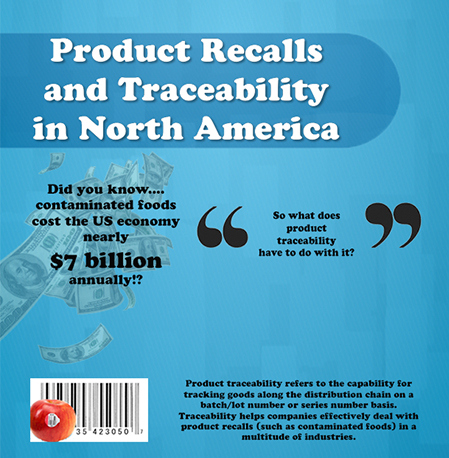[The following is a transcription of the above infographic discussing product traceability, the effect product recalls have within an industry and the importance of lot tracking as a business.]
Contaminated foods costs the US economy nearly $7 billion each year. But what does this have to do with product traceability? Traceability refers to the capability for tracking goods along the distribution chain on a batch/lot number or series number basis. Traceability helps companies effectively deal with product recalls (such as contaminated foods) in a multitude of industries. In the US alone, there was a total of 2, 363 recalls across all industries in 2011 – this amounts to about 6.5 recalls a day. Industries affected include: cosmetics, vehicles, environmental, auto, medical, food, pharmaceutical, boats, and consumer products – essentially any industry you can think of!
Looking at the food and pharmaceutical/medical industry more closely, the number of recalls in Canada has increased for the past several years and Health Canada expects that the rate of increase will likely remain more or less the same. In 2008 there were 206 recalls, 256 in 2009, 286 in 2010 and 298 in 2011. In the US recalls are also continuing to increase and it is widely reported that over 20 million people have taken a drug that has eventually been recalled. In 2008 there were 217 recalls, in 2009 there were 925, 390 in 2010 and 407 in 2011.
One of the biggest questions surrounding product recalls is who is responsible for managing product traceability. The short answer is that all members of the supply chain are responsible. This includes farmers, manufacturers, distributors, suppliers and vendors. Every member is responsible for being able to track product shipments and easily recall harmful products. That being said, according to the majority of statistics not very many executives are actively tracking their products. More than half of executives surveyed (51.6%) said it would take them longer than 48 hours to execute a recall and only 48.4% said they could do it within 48 hours. In terms of the greatest risk associated with the inability to track items along the supply chain, financial cost was the greatest at 28.1% with brand recognition (24.2%), consumer liability (18%), increased government oversight (12.5%) and loss of market share (11.7%) being the next greatest concerns. In addition only 54.3% of executives would be able to recall a specific item/lot without impacting other items/lots and 59% of food facilities surveyed did not meet the FDA’s requirements to maintain records about their sources, recipients and transporters.
Lastly, recalls have a huge financial impact on individual businesses, consumers and the economy as a whole. The average cost of a recall to food and consumer product companies is an estimated $10 million - this is in addition to brand damage and lost sales. When it comes to consumer perceptions, 93% of consumers believe that a company’s ability to handle a recall indicated whether a company cares more about profits of customer safety and 87% of consumers are more likely to purchase from companies that manage recalls “honestly and responsibly”.
The above infographic was prepared by Blue Link Associates. For more information on traceability download Blue Link’s whitepaper.










